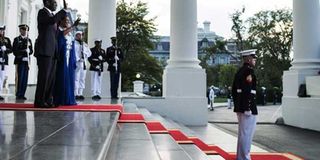The Washington, DC indaba: Have African leaders lost sense of shame?

The President of Equatorial Guinea, Teodoro Obiang Nguema arrives at the White House for a group dinner during the US Africa Leaders Summit August 5, 2014 in Washington, DC. When some leader summons African leaders into capitals abroad, the attendance is almost always full house. AFP PHOTO | BRENDAN SMIALOWSKI.
What you need to know:
- It is simply embarrassing for African leaders to troop into every western or eastern capital at the prompting of one or the other foreign leader.
- The only time you expect near full houses is when African presidents are mobilising to vote for their own immunities against sins they have committed or seek to commit against their people.
- Rarely did you see African leaders at the time use travel abroad as an occasion for a family tour. Nowadays, children of presidents are always in your face.
Last week, I was a resource person at the CODESRIA Democratic Governance Institute in Dakar where I spoke on Security and the Resilience of African Communities.
It was a rewarding engagement with African academics drawn from at least 10 African countries.
CODESRIA is an African social science organisation which, for over 40 years, has worked tirelessly to sustain research and publishing in Africa. During the years of crises within African universities, with sustained vicious attacks that destroyed these institutions, CODESRIA remained our only hope in Africa.
I visited CODESRIA for the first time in 1997 as a laureate of the institute to which I returned last week. This being 17 years later, I realised how I embody the story of CODESRIA.
The main contrast of the week was the sight of African leaders congregating in Washington, DC. It is not that African academics are so exemplary in leadership matters; but many keep a sense of pride in their institutions and our place in the world. In contrast, too many African leaders lack this value.
It is simply embarrassing for African leaders to troop into every western or eastern capital at the prompting of one or the other foreign leader. I was saddened to see one senior African on Facebook congratulate Uhuru Kenyatta for the photo with Barack Obama. Have our expectations sunk this low?
When a group of African leaders started the Conference of Intellectuals from Africa and the Diaspora (CIAD) initiative and convened a series of meetings, it was difficult for the conveners to get 10 presidents in any such meeting. The same absenteeism is true for many AU meetings.
FADDISH GATHERINGS
The only time you expect near full houses is when African presidents are mobilising to vote for their own immunities against sins they have committed or seek to commit against their people.
Yet, when some leader summons them into capitals abroad, the attendance is almost always full house. Many simply cherish the photo-op and sulk if that is not offered. This explains why, in the context of the social media frenzy, photos have been exchanged with alacrity.
As if to emphasise the utter irrelevance of the trooping to DC for African peoples, the media pays more attention to the fashion on display than the substance of the meetings, truly emphasising the faddish nature of these gatherings.
Thus over last week, the media was saturated with glamorous photos of the presidents and first ladies.
Contrast this with the 1960s when our leaders exhibited more substance that a photo-op frenzy can ever provide. For many of those leaders, nationalism conferred pride, and serious intellectual thought dominated bilateral engagements. Those leaders were not easily swayed by the glamour of western capitals.
A NEW ARISTOCRACY
Stories are told of how Mwalimu Julius Nyerere took on and dismissed Ronald Reagan in one such meeting after Reagan mouthed some propaganda.
Is it any wonder that it is Sedar Senghor who provided a home for CODESRIA in Dakar and conferred it with full diplomatic status in 1972? He understood the value of knowledge.
Rarely did you see African leaders at the time use travel abroad as an occasion for a family tour. Nowadays, children of presidents are always in your face.
While I can understand their right to public presence, it almost feels like African presidents just started procreating. We know little of Nyerere, Nkrumah, and Senghor’s children.
The main difference is not so much that they are too much in your face, it is how this translates into an entitlement to power and the glitter and glamour that goes with it. Indeed, we are in the throes of creating new aristocracy.
The time to go back to the basics is here with us. We must recall our founding values and the modicum of self-respect, dignity and pride in who we are as a people that these values demand.
African presidents must lead, not by shuttling across the world at the beckoning of any foreign leader, but by being led by a pan-African and people centred agenda. I feel like a voice in the wilderness.
Dr Murunga is Senior Research Fellow, Institute for Development Studies, University of Nairobi. [email protected]





